The Trump Administration Is Plotting To Impose “Total Economic Isolation” On Russia, As Germany Discusses Sending German Troops Into Syria To Attack The Assad Regime
The Trump administration is plotting to impose “total economic isolation” on Russia. This is happening while Germany is currently discussing sending its troops into Syria to help in the attack on the Assad regime. As we read in a report from the Daily Beast:
The US is discussing putting extreme sanctions on Russia, while Germany is discussing military deployment into Syria. This is happening when Germany has been in the midst of serious ongoing talks on increasing its military capacity. Its quite convenient for Germany that the push against Syria is occurring as Trump has been exhorting Germany to boost its military strength in the name of ‘paying your fair share.’ Now with Germany accelerating the increase of its military strength — in the name of following Trump –, and with the US wanting to cooperate with European countries against Assad, this is giving Germany the opportunity to use its military and expand its hegemony in Syria — and ultimately the Middle East — under the pretext of ‘bringing stability to the region.’ For years Germany has invested an interest in the replacing of the Assad government. Back in 2012, just a year after the beginning of the Syrian revolution, it was reported that Germany was working to contrive the government that would replace Assad after regime change had been completed, even training members of the Muslim Brotherhood, as we read in a report from RT:
The plan by Germany to bring in hundreds of thousands of Muslims, could be more about recruiting men into its military. One of the reasons why I suspect this is because the Germans have done this before, in the First World War. In the small German town of Wunsdorf, there is currently a refugee camp which houses about 637 people.
What is interesting is that in this same town of Wunsdorf, during the First World War, there was actually a refugee camp for Muslims. It was called the Halbmondlager (Half Moon Camp), and in it was built Germany’s first mosque. The plan behind the camp was to take these refugees and use them as soldiers against the British, the French and the Russians. The one behind the plan was Max von Oppenheim, a German diplomat and orientalist who loved Islam. He was also a propagandist who worked to rile up Muslims living in allied territory to attack the Entente (France, Great Britain, Russia and Italy). There is even a photo of him dressed as a Muslim:
Oppenheim once said:
“In the battle against England … Islam will become one of our most important weapons.”
When the Great War broke out, Oppenheim was commissioned by the German government to be responsible for the Foreign Office, managing German interests in the Middle East and the Islamic regions. After this, in August of 1914, Germany and Turkey signed the Ottoman-German pact as allies against the Entente. Germany’s reason for signing it was to use the Muslims to fight in a jihad against its enemies. The German General Chief of Staff, Helmuth von Moltke, desired that the Ottoman war minister, Enver Pasha, would weaken the Entente from within, that is, to stir the Muslims within Entente territory to revolt.
The Kaiser of Germany, Wilhelm II, told Enver that the Sultan-Calif should call for a jihad in Africa and Asia, exhorting for the Muslims to war against the enemies of Islam. Professors in Berlin, like the professor of Turkish history, Ernst Jackh, expected “Islamic fanatics fighting for Germany.”
Oppenheim told the Kaiser on the importance of capitalizing on the pan-Islamic movement that had begun in Turkey, to use their enthusiasm for jihad to recruit willful fighters against Germany’s enemies. Oppenheim wrote in his diary:
“In Constantinople a pan-Islamic movement started a couple of decades ago. The current Sultan took it over very skillfully and with great energy. He delegated envoys to the far-most regions of the Islamic world. And he attracted Islamic scholars to Constantinople through the translation of the Qur’an in all possible languages, of course in keeping the Arabic script, and through the inauguration of madrasas in South Africa etc.”
Oppenheim became the head of the Oriental News Department in Berlin in 1914, and employed a dozen academics and native Muslims, including the Islamic scholar, Abd al-Aziz Shawash of Egypt, Sheikh Salih al-Sharif al-Tunisi of Tunisia, Mamun Abu al-Fadl from the Hijaz of the Arabian peninsula, alongside three Tatar Muslims: Said Effendijev, Shamil Safarov, and Muhammad Kazakov. Together, they worked to form propaganda to ignite “anti-imperial” uprisings in the territories controlled by Germany’s enemies.
Oppenheim also gained the position as the head of the News Department within the German Embassy in Istanbul in 1915. He, alongside other Germans, wanted to devise a new brand of Islam, a “Euro-Islam,” in which Turkish Muslims would be considered Europeans. This Euro-Islam maintained the doctrine of jihad, and Oppenheim worked to start a global Euro-Islamic holy war against the Entente. To help spread his plan for global jihad, Oppenheim started a network of seventy reading halls and their chapters within the Ottoman Empire. The halls were easy to access and they were even supervised by German consuls. Leaflets of German propaganda were also distributed.
Propaganda was one means by which Oppenheim desired to rile up the Muslims against Germany’s enemies. The second means by which he wanted to lead the jihad against the Entente, was where the refugee camp in Wundsdorf came into play. He wanted to use the camp to recruit Muslim men into the German forces. The Muslims in the camp, who came from British and French territories, got their own mosque and their own newspaper, called Al-Jihad, to spread jihadist propaganda.
The Germans in fact had two camps, one in Wundsdorf, which contained about 5,000 Muslim men; and the other was in Zossen, which had more than 12,000. These refugees were actually prisoners of war who were taken by Allied auxiliary troops from India and African colonies, as well as from the Crimea, Kazan and the Caucasus. The prisoners were taken care of very well, given a mosque and the free exercise to practice their religion. “It was actually the Germans who were observing whether all the rituals that belong to [the] Islamic faith were [being] carried out or not,” says Reinhard Bernbeck, a professor of Near Eastern Archaeology at the Free University of Berlin.
In March of 1916, the German lieutenant, Fritz Grobba, led a battalion of one thousand French Arabs from Wunsdorf into Istanbul. Ironically, the Ottoman war minister, Enver Pasha, did not trust the Arab soldiers and made them slaves to work building streets. (Source: Islam and Muslims in Germany, ed.y Ala Al-Hamarneh and Jörn Thielmann)
Why would an Ottoman official enslave Muslim refugees? This signifies really a greater reality that few are noticing. In this history, Germany wanted to use Muslim refugees, and the Ottomans also wanted to use them; but here is the operative word: use. Today, Germany is using the Muslim refugees for a political agenda, and many people within the right-wing are acting as though Germany is being used by Turkey, or that it is some slave to Turkey for the cause of “multiculturalism.”
But here is the reality: Turkey also is using the refugees, and to a great extent, hates the refugees. Turkish border patrol guards will in fact open fire on refugees trying to enter Turkey. Apparently, Ankara cares more about its own agenda than its own fellow Muslims. Both Germany and Turkey could care less about helping poor refugees in the name of compassion. They both have an agenda, and if we are to look into history and see how these two countries conspired together, we can see that there is something eerily diabolical being devised. One of the most liberating experiences is to know what evils are being contrived behind the distractions that rivet the masses.
The camps in Germany that were used to hold these Muslim refugees were not just for military recruitment, but also for eugenist research. ‘Researchers’ would enter the camp and actually measure the skulls and the bodies of the Muslim men, a situation that was a part of the eugenist trend that would eventually escalate to the Nazi death camps and the horrific human experiments that would be conducted in the Third Reich.
So the Germans used these refugees not just as soldiers, but also for eugenics, and Turkey did not care at all, having no moral issue with enslaving them. It appears that the past is about to rhyme with the present. Germany has brought in multitudes of fighting aged men from the Middle East that would be potential recruits, and at the same time their presence is stirring up Nazi eugenist sympathies. Could the German government one day use the refugees as recruits for their army? In one report that came out last year, it says that “Germany has struggled to find enough recruits in recent years after the country put an end to conscription back in 2011.” In the same report it says that the German Defense Minister “Ursula von der Leyen has backed the idea of allowing non-German EU nationals to join the Bundeswehr.”
In a 2016 German media report, it says that “German Defense Minister Ursula von der Leyen wants to employ refugees in the army.” While Ursula did say that the refugees would be trained only in “crafts” such as technology, medicine and logistics in order to help rebuild Syria, she also said that “if there is a responsible government in the country [Syria], Germany can also support the training of security forces in the country.” Could this be future killing squads for Germany and Turkey? Time will tell, but it would not be surprising given the history of these two countries.
In order for the Syrian refugees to be trained for combat, they would have to have German citizenship. However, this rule could actually change, since Ursula wants to make it so that non-German EU citizens could join the Bundeswehr. It would not be surprising to see one day these refugees being integrated as EU citizens and then the abel-bodied men amongst them recruited for the German military.
Both the Germans and the Ottomans used each other to fight the allies. Thousands of Germans fought in the Ottoman Empire during the First World War. One of the more famous Germans who fought for the Ottomans was Rudolf Hesse, who would later become a major member of the Nazi party, and is currently one of the idols of neo-Nazis. Hesse recounted the intense moment of warfare in his first battle, when he fought against a number of Indian soldiers fighting for the British. “Meanwhile the Turks had been driven forward once more,” wrote Hesse, “and a counterattack was launched. …During the advance I glanced with some trepidation and nervousness at my dead man, and I did not feel very happy about it all. I cannot say whether I killed or wounded any more Indians during the battle, although I had aimed and fired at the enemy who emerged from behind cover. I was too excited about the whole thing.” Hesse would continue to fight for the Ottoman Empire, partaking in battles in Jerusalem and the Hejaz. He was awarded both a German Iron Cross, and a Muslim Turkish Iron Crescent. (See Ihrig, Ataturk in the Nazi Imagination, prologue, pp. 4-5)
GERMANY AND THE KOSOVO WAR
If you think that the pact between German and Muslim was exclusively in the First and Second World Wars, lets travel forward to the 1990s: the decade in which German diplomacy began to die; the decade in which Germany helped start the Kosovo War, arming and training Albanian nazis so as to advance German hegemony, just as their Nazi ancestors tried to control the Balkans. Nothing changes but the faces of the ones who want to make an ocean of blood.
After the Second World War, Germany was made to be a country, no longer for war, but for diplomacy and peace making. But this all began to crumble, in the 1990s, when the Germans began to instigate a war in Kosovo, against the Serbs and in favor for the Muslim pro-Nazi Albanians. The Germans began to arm and train Albanian nationalists, and was instrumental in the founding of the the KLA, or the Kosovo Liberation Army, so that they could attack Serbian authorities. What is most interesting about this situation, is that the Germans wanted to dominate the Balkans in the First World War, and they wanted to do the same in the Second World War, and recruited Albanians, Bosnians, Croatians and Ukrainians into the Nazi SS, so that they could slaughter Serbs, and control that region. The Second World War eventually came to an end in 1945, and people generally would believe that Germany would never return to the warpath, but in the 90s the Germans would train the descendants of the Albanian Nazis, that is, members of the KLA, to accomplish the very mission of the Nazis and their predecessors, to control Serbia.
The reputable German intellectual, Matthias Kuntzel, wrote a very revealing and detailed article, entitled Germany and Kosovo, back in the year 2000 on Germany’s role in starting the Kosovo War in the 90s, and it is from this article that I take most of my information on this event. As we read in Kuntzel’s report, since the 1990s, Germany has been wanting to pursue “self-determination,” to break the shackles what was placed on it since the end of the Second World War and expand German influence and hegemony. The German government believed, and still believes, that the only way to have stability in Europe is to have Germany no longer remain in its controlled position. As Rupert Scholz, the former German secretary of defense, explained:
“The aim of maintaining ‘stability’ in Europe seems to be a most dangerous one. There will not be any real stability, which is able to maintain peace, if individual nations are held prisoner in unwanted and unnatural (“unnatürliche”) state organizations, which have been imposed upon them.”
In other words, Germany wants to return back to its days of military power and strength, as opposed to remaining in the position that has been “imposed” on it. Germany wanted the same thing for the country of Albania. To the Germans, Albania was entrapped within Yugoslavia, and in the name of the racialist ideology of “self-determination,” deserved to become an independent country.
In the year 1991, an envoy from the German parliament (the Bundestag), arrived in Kosovo to have a meeting with leaders of the Albanian nationalist movement. Once this happened, a senior member of the Yugoslavian parliament was stirred to declare that “the British and the Germans would create a common intervention force with 70,000 soldiers in order to intervene in Kosovo.” The prediction would end up manifesting into a reality. In 1995, the German president, Roman Herzog, was in a meeting in the Albanian capital city of Tirana, in which Germany and Albania signed a common declaration of principle, promising a “solution to the Kosovo question” by pushing for the “self-determination” of Kosovo’s Albanians, that is, their right to secede from Yugoslavia.
The Germans began a program in which they secretly trained and armed pro-Nazi Albanian nationalists, and thus facilitating the creation of the Kosovo Liberation Army. In a 1998 European report, it says: “German civil and military intelligence services have been involved in training and equipping the rebels with the aim of cementing German influence in the Balkan area.”
The Germans were now arming and training the sons and grandsons of the Albanian Nazis that they had recruited into the SS Skanderberg Division. Another influence on the KLA was the National Front of Albania (or Balli Kombëtar), a political organization that allied with the Nazis during the Second World War. As Matthias Kuntzel explains:
Just like 1991 Germany again supported a movement with a background rooted in the Nazi past, because the KLA is partly led by the sons and grandsons of extreme right-wing Albanian fighters, the heirs of those who fought during World War II in the fascist militias and the ‘Skanderbeg Volunteer SS Division’ raised by the Nazis. The ‘National Front of Albania’ (Balli Kombetar) which collaborated with Nazi leaders in 1943/44 today boasts about its influence within the KLA which has a program that seems to be a modified version of the 1943 Nazi utopia. Thus the program of “ethnic cleansing” which Germany exported into the Balkans in 1941 remained alive within the movement of the Kosovo Albanian nationalists during the 80s.
These KLA terrorists, while being Muslims, were really successors of their German Nazi allies of the past, and they were continuing the relationship between a pro-Nazi Albania and Germany. In a 1982 article published by the New York Times, it was explained that the mission of the KLA was “to establish what they call an ethnically clean Albanian republic and then the merger with Albania to form a greater Albania.” They wanted an Albania “free of Jews”, “free of Gypsies” and “free of Serbs”.
The United States was reportedly upset over Germany’s operation in starting an armed rebellion in the Balkans, with editor Johann Georg Reißmüller of the Frankfurter Allgemeine Zeitung (a German daily newspaper) writing in 1997: “The US government is not at all happy with Germany’s policy in Kosovo”. The KLA would make attacks on the Serbian police, sparking a violent conflict, and thus destabilization commenced.
The Germans began to push the Americans when the Clinton administration was, in the words of Die Zeit, “still uncertain about how to deal with the crises” in the Balkans. A senior official of the German foreign office was sent to Washington to push the deputy secretary of state, Strobe Talbott, telling him: “We urgently need U.S. leadership now”. Between March of 1998 and March of 1999, the Germans continued this pressure on the Americans. The US government was in fact split between two opinions: one that stated that the KLA should be supported against Milosevic, and the other that said that Milosevic should be allowed to crush the Albanian terrorists. Washington ended up pushing the Germans to cease providing weapons to the KLA, and declared that the KLA were involved in terrorist activities. The newspaper, The European, stated in a 1998 report:
“Washington realised that pushing the Kosovars towards a military confrontation with Milosevic, as the Germans wanted to do, would have a boomerang effect on the Balkans. The United States put maximum pressure on Germany to stop supporting the KLA behind the scenes, as did the other European countries such as Britain and France.”
The KLA, in accordance to plan, continued its attacks on Serbian police officers, provoking them to counterattack, thus carrying on the conflict. The attempt by the United States to supposedly de-escalate the situation failed because of the continual flow of arms and the continuous recruitment of mercenaries for the KLA. In the summer of 1998, the United Nations, alongside the majority of NATO counties, including the US, persisted on cutting off the flow of arms into the hands of the KLA. Even Fatos Nano, the head of the Albanian government agreed with this and disassociated himself with the KLA. On the KLA destabilizing Nano’s government, the British academic, James Pettifer, writes:
“In 1998, full-scale violence erupted in Kosovo as the Albanian militants of the Kosovo Liberation Army (KLA) attempted to wrest control of the disputed Yugoslav province of Serbia. This soon succeeded in destabilizing the fragile Nano government.” (Source: Pettifer, Albania: The Democratic Deficit In The Post-Communist Period)
NATO wanted to send 7,000 troops into Albania to cut off the arms flow for the KLA. Germany rejected NATO’s attempt to do this, with the head of the German foreign office saying:
“Of course you have to consider whether you are permitted from a moral and ethnical point of view to prevent the Kosovo-Albanians from buying weapons for their self-defense.”
The head of the German Ministry of Defense, Volker Ruhe, said:
“You cannot resolve the Kosovo conflict by sending troops to Albania to seal the border and thus be acting in favor of Milosevic.”
German media was ecstatic to find out that Germany was successful in pushing for NATO forces to support Germany’s cause in Kosovo. The influential Frankfurter Allgemeine wrote that Germany had “given evidence of its preparedness to lead”. The New York Times reported: “German officials seem increasingly inclined towards charting a military course to stop the violence in Kosovo.” But Germany did not want to stop the violence, they were acting as saviors to a problem that they helped begin.
The Germans wanted to bomb Serbia, even though Germany was suppose to be a nation of peace and diplomacy on account of its Nazi past. A New York Times article from 1998 shows how the Christian Democrat, Volker Ruhe, was pushing for the bombing of Serbia, and how Germany was offering its own bombers to carry this out:
Military and civilian officials here did not give details of their plans for air strikes, which include both a ‘’limited air option’ (strikes by American ship-based cruise missiles against Serbian military targets in Kosovo and beyond) and a ”phased air campaign” (attacks on command headquarters inside Serbia).
‘Something has to happen soon; we can’t just sit back now,’ said Germany’s Defense Minister, Volker Ruhe, who also said he was worried about damage to the alliance’s credibility.
Mr. Ruhe said Germany was prepared to contribute 14 Tornado fighter-bombers to an air campaign, and called on the alliance to issue an ultimatum within the next 10 days if Mr. Milosevic does not keep his repeated promises to end the attacks.
In 1994, Volker Ruhe affirmed that the German army would be “an instrument of foreign policy.” By this time, Germany became the second largest arms exporter, after the United States. And after Germany’s reunification, thanks to the fall of the Berlin Wall, Germany had 350,000 soldiers, the largest army in Europe. (See Martin Lee, The Beast Reawakens, p. 284)
WW1 AND SERBIA — THE STORY CONTINUES
The biggest misconception about World War One, is that it was started because the Archduke Franz Ferdinand and his wife Sophie were murdered in Bosnia by a Serbian nationalist named Gavrilo Princip. The assassination of the Archduke and his wife did not cause the First World War, rather it provided the occasion and the pretext by which Germany and the Austro-Hungarian Empire could start a war with not just Serbia, but the whole Entente, that is, Russia, Great Britain, France and Italy.
Even before the assassination occurred, the Germans were planning on making a war, only waiting for the right situation in which they could justify making their attack. In 1913, the German military leader, Helmuth von Moltke, warned against the idea of making a war without the right circumstances. Moltke wanted a war, believing in an apocalyptic envisioning in which Germans and Slavs would fight for world power. He once said “that a European war is bound to come sooner or later, in which the issue will be one of a struggle between Germandom and Salvdom.” But while wanting blood, Moltke, in all of his conniving ways, said: “When starting a world war one has to think very carefully.”
Moltke worked closely with the Chief of the General Staff of the Austro-Hungarian Army and Navy, Franz Conrad von Hotzendorf, who was planning on a war to destroy Serbia dozens of times before the assassination even happened. In the words of the Scottish military historian Hew Strachan:
“Conrad first proposed preventive war against Serbia in 1906 and he did so again in 1908-9, in 1912-13, in October 1913, and May 1914: between 1 January 1913 and 1 January 1914 he proposed a Serbian war twenty-five times.”
Why were the Germans so fixated on vanquishing and conquering the Slavs? It was all based on Social-Darwinism, in the belief that the German race must dominate the Slavic people. The Kaiser of Germany himself, Wilhelm II, said in October 23 of 1913: “The Slavs are born not to rule but to obey.” The reason as to why the Germans wanted to dominate the Slavs, be they Catholic Poles or Orthodox Serbs, was the same reason as to why the Germans instigated the attack on Serbia in the 1990s: a eugenist envisioning of Germanic domination over those they deem as inferior.
Wilhelm II stated, before the assassination of the Archduke, that “if Russia supports the Serbs, which she evidently does … then war would be unavoidable for us, too.” Helmuth von Moltke, prior to the assassination, said: “I believe a war is unavoidable and the sooner the better.” However, Moltke calculatively said that before a war could be done, “we ought to do more through the press” in order to foster popular support for a war against Russia. The Germans were very calculative. Before the assassination of the Archduke, the German government was hoping that Austria would be attacked, so that Austria would make the decision to go to war so as to make Germany appear as merely a defending nation. The German Chancellor, Theobald von Bethmann Hollweg, explained this strategy to the Kaiser:
“If it comes to a war, we must hope that Austria is attacked so that she needs our help and not that we are attacked so that it would depend on Austria’s decision whether she will remain faithful to the alliance.”
The Germans had itchy trigger fingers that were yet tempered by their cunningness. This mentality was reflected in how they saw the situation between Bosnia and Austria-Hungary. In 1908, the Austro-Hungarian Empire administered Bosnia-Herzegovina while the province was nominally ruled by the Islamic Ottoman Empire. Turk and German ruled over this land, as part of an agreement that was made in the late nineteenth century. In the year 1878, at the Congress of Berlin, the Turks and their Germanic allies agreed that the Ottoman Empire would own Bosnia-Herzegovina, but that Austria-Hungary would have the authority to occupy that land with its troops.
In 1908, the Dual Monarchy of the Austro-Hungarian government declared that it was going to annex Bosnia-Herzegovina. It did so by brokering a horrible deal with Russia. The Austrian diplomat, Alois Lexa Von Aehrenthal had promised the foreign secretary of Russia, Alexander Izvolsky, that if Bosnia-Herzegovina would be annexed, that the Dual-Monarchy would provide easy access for Russia to travel through Constantinople and the Straits. This of course was a lie. Bosnia-Herzegovina was annexed, and Russia was in fact pressured by Berlin to not react. What is interesting about this story is not just the deception that was used, but the reaction of Helmuth von Moltke. Moltke was in fact disappointed that the Bosnian situation did not lead to war, warning that such an opportunity: “will not come so soon again under such propitious circumstances.”
What all of this proves is that Germany has a reputation of wanting bad situations to take place, so as to use them to justify militarism and aggression. The Germans planned out their war against the Slavs and the Entente, and then used the assassination of the Archduke to then act as defenders, when in reality they were seekers of any occasions by which to start war against nations who had no interest in going to arms with Germany. The assassination of the Archduke, in the words of historian David Fromkin, “was not, however, the reason that the Dual Monarchy sought to destroy Serbia. It could not have been the reason, for, Franz Ferdinand apart, the Hapsburg leaders wanted to destroy Serbia before the assassination.”
As part of the goal of racial domination, amongst the objections was to eliminate Serbia as “a factor of political power in the Balkans.” The Austrians didn’t want Serbia to simply surrender, they wanted Serbia to be utterly destroyed, or in the words of Fromkin, they wanted “to wipe it off the map.” As the Germans and Austrians were devising their bloodbath, they made sure to put up an act to the world that everything was going well. The Austro-Hungarian politician, Count Leopold Berchtold, and the German diplomat, Theobald von Bethmann-Hollweg, believed in deceiving the other European countries by maintaining normal vacation schedules for government officials, in order to create an illusion of peace.
Berchtold told his war minister and his army chief of staff to go on vacations “to prevent any disquiet.” The Austrian Emperor Franz Joseph also went on vacation, while Chancellor Bethmann retired to the countryside. Moltke took a trip to the famous spa in Carlsbad and the foreign minister left to enjoy his honeymoon. The German grand admiral, Alfred von Tirpitz, also went on vacation. It was all done to create the illusion that everything was normal, when behind closed doors a conspiracy was being done to bring the continent into one of the bloodiest conflicts in history.
In the words of Fromkin, “It was like a play in which everything of importance happens offstage.” (Much of the presented information on WW1 has been taken from Fromkin’s book, Europe’s Last Summer) And indeed, it is the reality today. Distractions are made for the world to see, while the conspiracies to bring mankind to ruin are devised behind the chaotic happenings of the moment. The story of how Germany and Austria-Hungary managed to deceive the masses into believing in a false peace, goes to show how cunning they are in the art of mass deception. The deception is so deep, it will overtake the masses and have them look up to the despots as saviors from the very chaos that they created.
Germany and Turkey were instrumental in causing the migration crises that has so altered the political climate in Europe, which is making fascism and eugenics more and more favorable. What is the agenda? While we cannot give explicit details as to what they plan next, what we can say is that its nothing good. As Germany desired terrorism in the past, to justify war, I believe its doing the same with terrorism, hence why they brought in the migrants, knowing full well that the wake of jihadism in the country would provoke a bolstering for militarism. But so many are taken into sympathy for Germany, seeing it as a nation of peace and diplomacy. “But evil men and seducers shall grow worse and worse: erring, and driving into error.” (2 Timothy 3:13) The same deceived masses, filled with error and driving others into error, were very active before the eruption of the First World War.
In 1911, just three years before WW1 in 1914, the president of the University of California at Berkley, the Germanophile, Ide Wheeler, nominated Kaiser Wilhelm II for the Nobel Peace Prize. In 1913, a large number of articles were published in Germany, declaring the Kaiser as the Friedenskaiser, or “Emperor of Peace.” In June of 1913, the New York Times published an article by Alfred Fried, the founder of the German peace movement, that stated this about the Kaiser of Germany:
“His glory as a man of peace, great enough now, will become greater, and his wish to figure in history as a hero of peace will be fulfilled.” (See Emmerson, 1913, p. 77)
With this are we reminded of the words of St. Paul: “For when they shall say, peace and security; then shall sudden destruction come upon them, as the pains upon her that is with child, and they shall not escape.” (1 Thessalonians 5:3)
Turkey and Germany, two nations of genocide, created this migration crises in Europe. What is the end goal, but tyranny? And while the world looks to Germany with sympathy and hope, we marvel ourselves to our own destruction. Germany wanted Serbia in WW1, and worked with the Ottoman Empire; near the end of the First World War, the German general, Erich Ludendorff, envisioned the Social-Darwinistic removal of two million Poles from Polish territory that Germany wanted to annex for the cause of pan-Germanism (see Tooze, The Deluge, ch. 6, p. 135). The leopard did not change its spots. In the Second World War, the Nazis, in conjunction with Albanian and Bosnian SS officers, butchered millions of Catholic Poles and Orthodox Serbs. In the 1990s, Germany worked with Albanian nazis and instigated a NATO strike on Serbia. What has changed, but the face behind which evil doers spill blood? And since the battle stems from principalities in dark places, the objective is ultimately to slaughter Christian Catholics and Christian Orthodox. It is an evil conspiracy that did not begin on earth, but in the minds of the demons of the abyss: “For we do not wrestle against flesh and blood, but against principalities, against powers, against the rulers of the darkness of this age, against spiritual hosts of wickedness in the heavenly places.” (Ephesians 6:12)
Turkey and Germany, Crescent and Swastika, united in their thirst for carnage; when the scimitar shaped moon, and its Protestant ally rise again, maybe then, will Christendom arise for one more battle, for the soul of humanity. The nazis have never left us, they only changed their faces. Evil is continuously adapting, what never adapts are the masses that follow it.



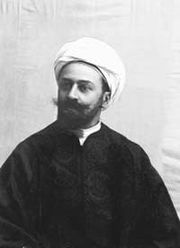
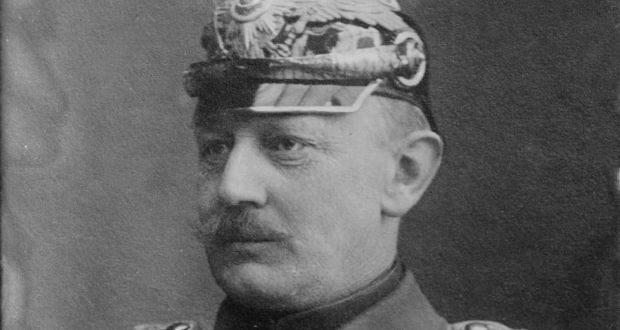
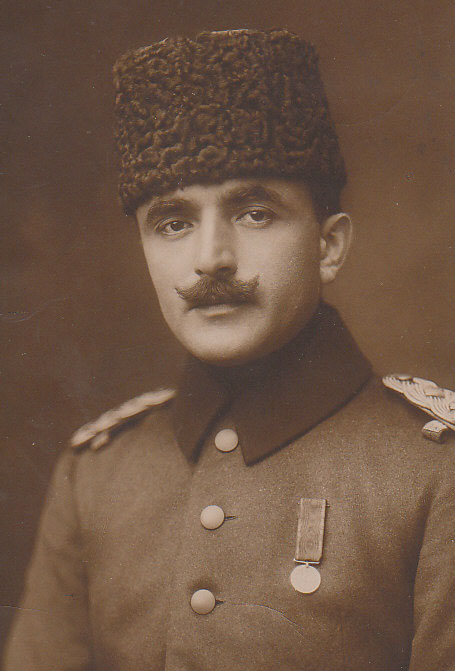

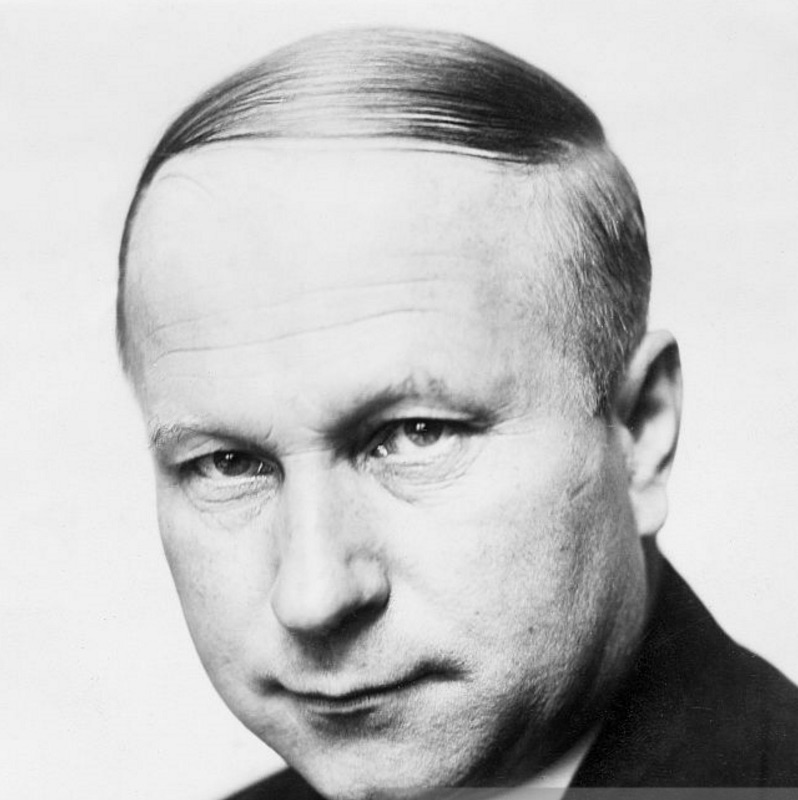

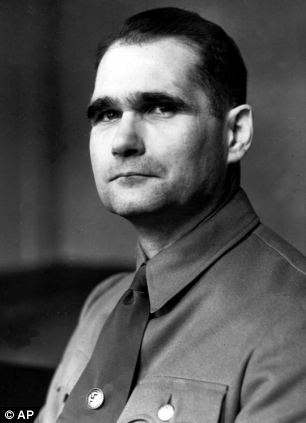


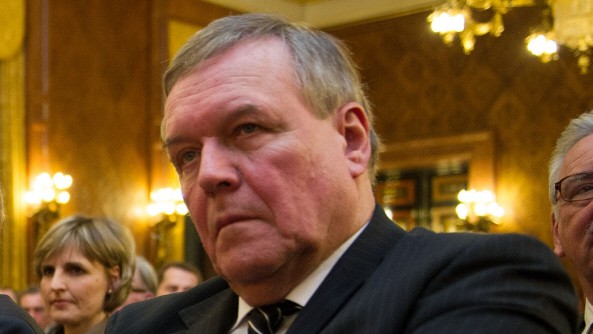
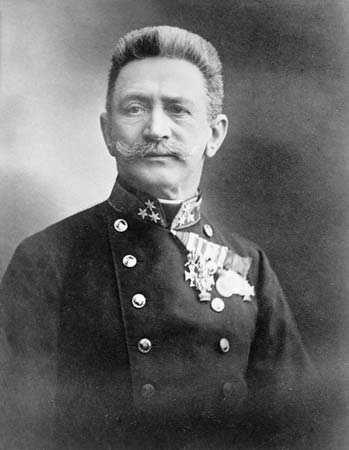



Comments are closed.